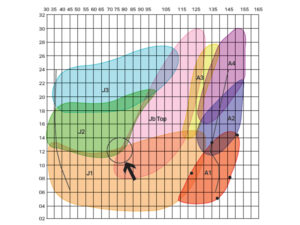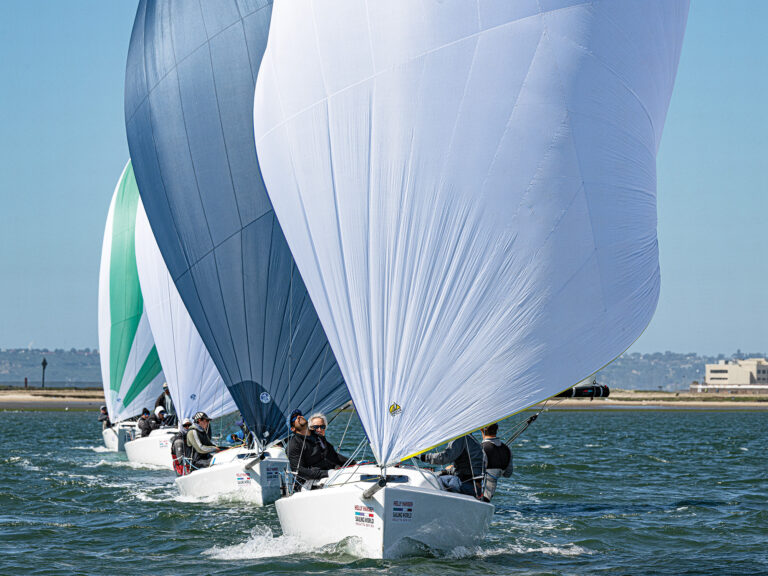
Most competitors avoid direct confrontations. The majority, when on starboard jibe approaching an opponent on the port layline, will jibe several boatlengths before they reach him so as not to interfere with his course or wind. Some delay their jibes until they are in a position to blanket their opponent while retaining an inside overlap at the mark ahead. But only an aggressive few hold their starboard jibe until their opponent is forced to jibe away from them and then, when they are certain to be clear ahead, jibe to port on the layline.
As he sails out to the racecourse, the aggressive competitor is preoccupied with his intention to manage the race, particularly the start and the first beat. He concentrates on what he will do and feels no concern for the plans or expectations of his competitors. Except in the latter stages of the race or the series, he considers the latter to be merely members of an anonymous crowd that he will dominate and manipulate to his benefit.
One hard-nosed tactic does not ensure a victory, but it is aggressiveness of this sort that distinguishes winners and is most determinative of their victories. A relative few, the aggressive, dominate in every sport and regularly win, while a vast considerate majority—who, of course, find alternate ways to enjoy their involvement—regularly lose. The aggressive sailor starts in a manner that assures he will be in the front row and in clear air when the start-gun fires. He tacks beneath a neophyte who will respond to his luff, permit him to open a gap to leeward, and refrain from attempting to drive over him. He will luff this opponent until a few seconds before the gun, bear away on his leebow, and give him a dose of backwind to ensure he falls astern. He drives off to blanket anyone who might backwind him. He takes advantage of every crossing to force his opponents to the wrong tack and to maintain his own clear air on the correct one. As he rounds the marks he makes sure he has an inside overlap and takes all the room he needs. On reaches and runs he stays in the passing lane and waves away anyone who seems tempted to get on his wind.
Pecking orders develop because competitors rank and interact with each other on the basis of their assessment of each other’s deservedness. The aggressive competitor is distinguished by his rejection of this principle and his assumption that, at the very least, no one is more deserving than he. Instead of being stoic and accepting of a poor position and its likely outcome, he fights to pass the boat ahead.
Buddy Melges, an aggressive competitor, says, “Never give up!” The aggressive competitor resents anyone who is ahead of him, who beats him or who threatens to beat him and feels driven to beat that opponent. He believes that he, not they, deserves to win and conducts himself vis-à-vis his competitors to ensure that he does. He believes his competitors ought to submit to him, assumes that they will and finds that they usually do. Aggressiveness is a public declaration of the resolution of a competitor’s ambivalence about winning, of his disregard for the hopes and welfare of his opponents and of his intention to beat them.
Modern aggressiveness is a greatly diminished residue of the genuine resentment and ferocity that, by convincing predators that they should avoid a fight, permitted primitive man to survive. It is resentment that drives the successful competitors. Resentment is the underlying engine of competition. It is resentment, not love, that makes the world go round. But we have learned that resentment threatens our acceptance and the social order; consequently, we fear it, forbid its expression, and deny that it exists.
We are descended from resentful, aggressive individuals who survived in a very hostile world, but who also—when they formed packs—learned to become socially acceptable beings. As a result, modern competitors have received two (almost) incompatible endowments: resentment and its consequence (aggressiveness) and acceptance and its consequence (submissiveness).
Most competitors fear being aggressive, fear resentment, fear being resentful, and fear to beat the more deserving members of their own pack. They are only able to be aggressive when they feel more deserving than their opponent. They believe people should get what they deserve, that competitors should achieve what they deserve—and no more. They believe that much of aggressiveness is bullying, a pathological enjoyment of dominance, and are unwilling to behave as bullies. Consequently, they presume that anyone who is not a bully, but is able to express his resentment and be aggressive must be justified in doing so and conclude that the aggressive are deserving of the room, the advancement, and the victory they demand.
To mollify the resentment he has engendered, the victor of every battle praises the bravery of the loser and the winner of every race assures the defeated that his talent and aggressiveness had little effect on the outcome; he had just been “lucky when the wind shifted his way.” The defeated are all-smiles at the trophy presentation, joining in the camaraderie, praising the winner, trying to convince him and themselves that they admire him and that they harbor no resentment.
Psychologists speak of “effective aggression” which is a controlled, useful, and appropriate response to resentment, and distinguish it from “hostile aggression”—anger—an irrational, impulsive, and distressing response.
When used to advance one’s legitimate aims, one’s opponents respect effective aggression and in many cases, admire it. Anger, however, is taboo. Because we fear the display of resentment, we object to a display of anger and presume that it is indicative of inadequate self-control. Anger may be more appropriate than some other irrational responses to resentment, but it distracts, obscures the goal, and typically fails to resolve the emotional tension. Crews do not enjoy angry skippers (nor, skippers, angry crews) and neither enjoys angry opponents. Competition—fleets, classes, and regattas—should be kept free of anger. We show our consideration for our fellow sailors by controlling ourselves. Just as when we feel fear, we prize fearlessness, so when we feel aggressive, we prize restraint.









